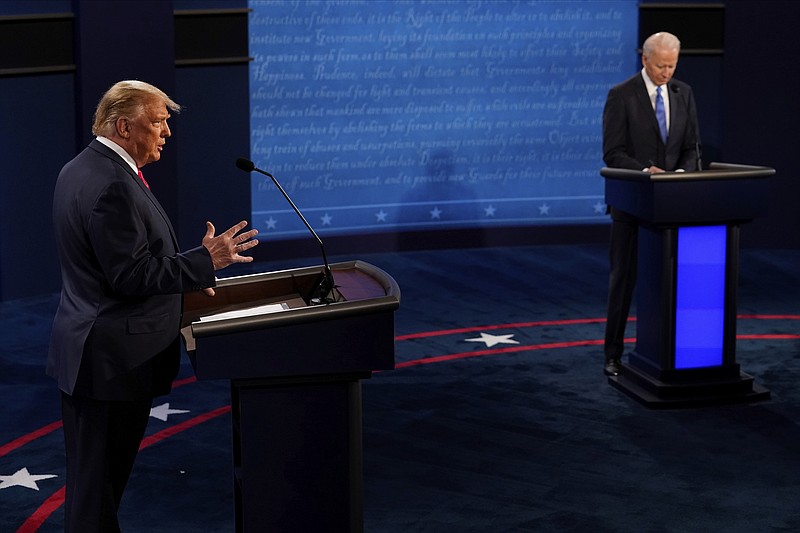Are presidential debates worth our time?
It's a legitimate question and one we would never have asked as recently as 20 years ago.
When debates returned to the American stage after a 16-year absence in 1976, they were a service for the voter. President Gerald Ford, the nation's first unelected president who had not been elected vice president, was facing a relatively little known former governor named Jimmy Carter. The debate showed Carter could go toe to toe with the president.
Four years later, Carter, whose term had not gone all that well, was facing former actor and former California Gov. Ronald Reagan. While the results of Carter's management of the previous four years were on display for all to see, Reagan was thought to be a cowboy, inexperienced and shallow. The debates helped voters get to know him better.
In 1988, as in the first presidential debate in 1960, the election had no incumbent. Voters needed to see if a third straight term of Republican rule under then-Vice President George H.W. Bush would be preferable to Democratic Massachusetts Gov. Michael Dukakis. The debates that year arguably allowed them to be comfortable with Bush.
But four years later, the economy had hit a sour patch under Bush, and voters were anxious to see if Democrat Bill Clinton - the first nominee of a new generation - was capable. The debates that year also featured third-party candidate Ross Perot, who was polling high enough at the time to grab a spot on the stage.
In 2000, again with no incumbent, the nation looked to the debates to allow them to choose between wooden Vice President Al Gore - whose administration could tout a strong economy but also a presidential sex scandal - and popular Texas Gov. George W. Bush.
We would argue that the U.S. Supreme Court's decision that resulted in the election of Bush effectively ended the chance of any future debate actually having an unbiased moderator ask candidates questions that neither favored nor opposed one candidate.
Although the national media has favored Democratic presidential candidates for at least 60 years, their bias turned a corner after Bush, who won fewer popular votes than Gore, was elected. Since then, their spin on candidates, the moderators chosen for debates and the questions chosen by moderators all have favored Democrats.
Pundits have written frequently since then about the Republican candidate having to debate the Democratic candidate and the moderator. Thursday night's debate between President Donald Trump and challenger Joe Biden, the former vice president, was no exception.
Although the president acquitted himself well and his opponent was exposed in a raft of lies, the moderator, Kristen Welker of NBC News, nevertheless tailored her questions to be more antagonistic toward Trump and less so toward Biden. True, unlike many of her media colleagues, she did ask a question about the former vice president's foreign entanglements, but she allowed him to talk more and interrupted the president more frequently.
The media aside for a moment, we have trouble imagining an undecided voter tuning in Thursday and saying, "Let's see what these Trump and Biden characters are all about."
Trump has been in office for three and three-quarters years, and Biden has been in Washington for 47 years. And, even given that, Biden's been standing on debate stages with his fellow Democrats jonesing for the nomination since June 2019.
Yes, on Thursday night we found out Hitler used to be our friend and that Trump is Abraham Lincoln, but aside from the comedic moments, did we learn what health care plan Trump has in mind? How Biden will make China pay for the coronavirus? If Trump would push an infrastructure plan in a second term? How Biden plans to pay for all the freebies he's promising voters?
No, no we did not.
The debates have become exercises in which moderators compete to ask the most gotcha questions of Republicans. They've become tasks where candidates don't answer the questions they don't want to, then run on about whatever other subject suits them better. They've become activities where what's said in the spin rooms becomes more important, where the night's biggest gaffe is its highlight and where the questions the public is dying to ask are left unasked.
After 2000, has there been any significant moment in a presidential debate that moved the needle, where viewers tuned in to learn something about the candidates they didn't know, where the moderators and the questions were judged as fair by both sides?
No, 24-hour news stations, social media and the internet have made information about candidates ubiquitous - the truths and the untruths.
If things remain as they are, we're not sure presidential debates ought to continue. We wonder if the electorate isn't feeling this way too.
